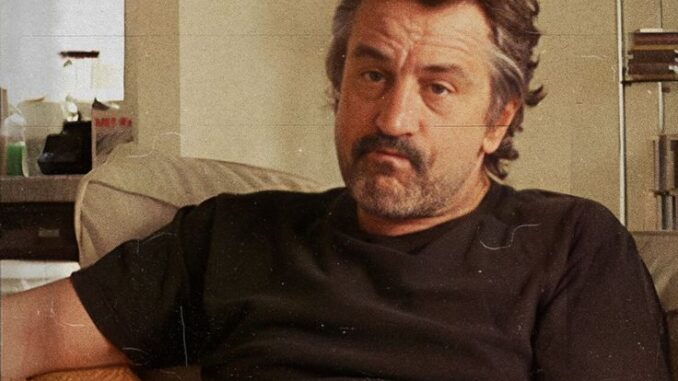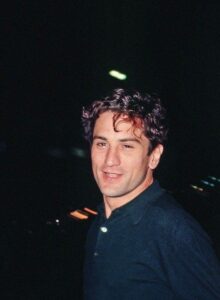
A Rare Talk With Robert De Niro

His brilliant career includes a cast of characters ranging from a crackpot cabbie to the Devil himself. Now the enigmatic actor turns his talents to comedy with ‘Midnight Run’
In David Mamet’s Broadway hit Speed-the-Plow, a frenetic Hollywood producer visits the office of a studio exec and friend. On his lips is the magic name of a major male star who has agreed to star in his prison picture. “Dougie Brown,” he hisses to the exec. Then he spreads his hands as if fanning the name across a marquee: “Douglas Brown.” Yeah, he admits, it’s only a prison picture, but it stars . . . Dougie Brown.
There are several magic names in American films. Some sneer and tote guns. Two made a $40 million mistake not long ago. One is named Eddie. One has blond hair and the best intentions. The one we may be fondest of is a Laker fan, and inimitably gifted. But for mixing box-office appeal with mystique and, above all, acting genius . . .
That didn’t take long, did it? We can measure Robert De Niro‘s capacities by the number of characters we remember so vividly from his twenty-some films: Johnny Boy (Mean Streets), Vito Corleone (The Godfather, Part II, Academy Award for Best Supporting Actor), Travis Bickle (Taxi Driver), Rupert Pupkin (The King of Comedy). Historical figures Jake LaMotta (Raging Bull, Academy Award for Best Actor) and Al Capone (The Untouchables) put their own names out there, but whatever immortality they carry into the coming decades will be shared with De Niro.
Though De Niro has had success with a variety of directors, an entire pride of Italian American auteurs – Brian De Palma, Martin Scorsese, Francis Ford Coppola and Michael Cimino – has collaborated with him on some of his best work. Scorsese, who grew up on the same New York streets as De Niro, particularly seems to know what code to use to channel the actor’s often fearsome screen presence – a presence full of choked rage – into compulsively watchable cinema. (Pressed for details about their teamwork, though, the actor says that offhand he can’t recall much: “I haven’t worked with Marty on a movie in over five, six years. I forgot some things.”)
Around 1984, De Niro’s career took a curious turn. Sergio Leone’s epic Once upon a Time in America, with De Niro and James Woods as Jewish gangsters, came in at almost four hours, was radically cut for U.S. release and never had its intended impact. That year De Niro was also seen opposite Meryl Streep in Falling in Love, which got an indifferent reception. Nor was his next full-scale outing, in The Mission, likened to his earlier thunderbolts. He also did a series of odd cameos: a witty, weird moment as a technician in Brazil, a charged rum as Louis Cyphre – the Devil – in Angel Heart and the brief but effective portrayal of Capone.
De Niro’s mystique has long been entwined with that of his great-American-actor predecessor, Marlon Brando. Mindful that Brando halted his career in its late prime and went out to pasture like an old bull while doing expensive cameos, observers began asking if De Niro, who turns forty-five this month, was on the same course.
Midnight Run is part of the answer. Originating in a witty and good-hearted script by George Gallo (Wise Guys), it became a thoroughly Hollywood project, shaped under the aegis of the powerful Creative Artists Agency, which had recently signed De Niro. Director Martin Brest, also a CAA client, was both a credentialed sensitive type (Going in Style) and the director of an in-your-face hit (Beverly Hills Cop). Universal is pushing Midnight Run as this summer’s blockbuster action comedy.
De Niro was such an impeccable team player that he even submitted to this rare interview. Rare for good reasons: he’s notoriously shy, and as a talker he reveals little of the brilliance he displays onscreen. Our get-acquainted meeting came on location in De Niro’s suite at the Aladdin Hotel, in Las Vegas. Blinking neon signs from the Strip helped illuminate the barren room – De Niro had presumably made the place into the kind of shabby motel room his bounty-hunter character would occupy on the road. Our next meeting (which, like the first, came after several postponements) took place one afternoon in the Mayflower Hotel, in Manhattan, in the suite that had served as Jake LaMotta’s Detroit hotel room in Raging Bull. Clearly not delighted with the chore at hand, De Niro was rigorously polite and just a bit threatening. “How did you like that answer?” he asked with an odd mixture of defiance and contriteness after one effective evasion. A follow-up phone session came after he wrapped Jacknife, a film about Vietnam veterans that costars Ed Harris and Kathy Baker. Finally, before he went off to begin Stanley and Iris, opposite Jane Fonda, he appeared at a Manhattan press conference for Midnight Run. He was amiable, if not notably revealing. When one reporter asked him what the biggest misconception about him was, De Niro squinted and replied, “You think I’m gonna tell you?”
